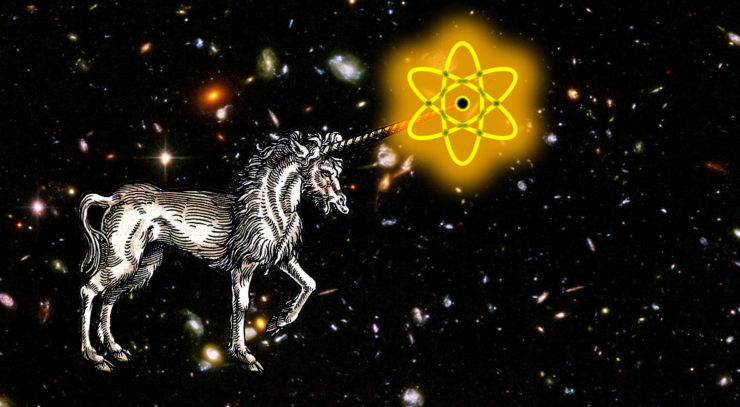Sooner or later, the old but apparently evergreen debate over the various merits of Science Fiction vs. Fantasy and the boundaries between the two resurfaces like some kind of grim Lovecraftian deity, accompanied by the usual chants and drum beats. For whatever reason, there will always be those that insist that the books they read many years ago as young people set an eternal, infallible, incontrovertible standard for what is right and proper in the field of speculative fiction, and then decry any perceived deviation from those rules vigorously and volubly, in the same way one might urge the inconsiderate young to vacate the grass in front of one’s domicile.
For those who stopped personally experiencing the passage of time sometime in the Reagan Era, it’s simply a matter of pointing back at the past and saying, “In my day, we could tell science fiction from fantasy.” Science fiction bore an atom sticker on its spine, whereas fantasy sported the far less respectable unicorn. This indicated quite clearly to the reader that science fiction stood for reason and science and all those good things, whereas fantasy was mere…fantasy.
Perhaps some examples are in order…
Science fiction provides its readers with iron-hard, fact-based possibility. For example, Frank Herbert’s Dune played with the possibility that the right combination of eugenics and hallucinogenic drugs (taken from enormous alien worms) might allow messianic figures to draw on the memories of their ancestors. Well, how else would it work?
Science fiction teaches us that starships, when hurled precisely enough at black holes, might reappear light years away; that over a century of experimental support for relativity has probably overlooked some loophole of the sort that facilitates exciting plots; that in a universe more than ten billion years old civilizations will probably emerge on worlds across the solar system Milky Way in the same handful of millennia, thereby facilitating narratives in which alien species wield technologies that are somewhat close to those employed by us humans.
Science fiction teaches us that the secret of fusion could easily be ours provided we take the simple step of sending astronauts to the Sun to collect a cup of plasma; that extracting material from Jupiter merely requires inserting a long straw (so that Jupiter’s internal pressure can provide the motive force to drive material into orbit, of course); and it also reminds us that space stations have for decades been inexplicably neglecting to replenish their air supplies with long hoses dangling from low Earth orbit into the upper atmosphere.
All perfectly reasonable assertions based in gritty hard science…except for those bits of inconvenient science that might undermine the sort of stories people want to read.
Where but science fiction could we find stories like Pohl and Williamson’s Reefs of Space series, which explores the possibility that the Oort Cloud could be filled by an ecosystem powered by biological fusion and that a few lucky humans might someday enjoy mind-melds with intelligent stars? And where but in science fiction could we entertain the quite reasonable possibility that someday a young woman with whichever psionic powers the plot of the week requires might have to contend with invisible cats? Who but science fiction writers will remind us of the very real possibility that one day starships might be propelled at superluminal velocities by the power of women’s orgasms?
And what, on the other hand, can mere fantasy offer? Airy-fairy nonsense, like Tolkien’s peculiar belief that wartime trauma can last a lifetime. Well, what slide rule did he use to calculate that? Addison’s The Goblin Emperor similarly wastes readers’ time with a clear-eyed, sensitive exploration of how to resist the urge to continue a cycle of abuse without any discussion of plasma-borrowing missions or giant space-straws to move things along. Bujold’s The Curse of Chalion urges dogged persistence in doing the right thing, even when it hurts, even when it seems hopeless. Fantasy is simply a gossamer illusion concerned with matters that will never have any relevance to the real world.
Perhaps the most damning indictment of fantasy comes from those authors who took time out from writing proper science fiction to dabble in mere fantasy. Fritz Leiber, for example, demonstrated that he was more than able to present the world with entirely sensible novels about cat-women stealing the Moon but still he inexplicably wasted time spinning yarns about two men in some a dubious place called “Lankhmar.” I suppose these stories let him examine aspects of “character” and “companionship” and other hypotheticals that cannot be measured in a lab, but what of all the poor cat-girls who went unwritten?
Jo Clayton stands as another example: She could have focused on exploring perfectly reasonable possibilities, like the ever-present concern that strapping on alien psionic amplifiers might greatly complicate the search for a lost homeworld, but instead she chose to write fantasies in which characters invest a lot of time looking for affordable birth control. I ask you, how often is birth control going to come up in the real world? And isn’t time spent worrying about such issues time that would be better spent pondering what to do when enigmatic aliens want their toys back?
So set aside your comforting but empty fantasy novels, which will never provide you with anything of value beyond the occasional insight into human nature, and go pick up a proper science fiction novel. And the next time you’re tempted to stray, just think of the poor hypothetical cat-girls!
In the words of Wikipedia editor TexasAndroid, prolific book reviewer and perennial Darwin Award nominee James Davis Nicoll is of “questionable notability.” His work has appeared in Publishers Weekly and Romantic Times as well as on his own websites, James Nicoll Reviews and Young People Read Old SFF (where he is assisted by editor Karen Lofstrom and web person Adrienne L. Travis). He was a finalist for the 2019 Best Fan Writer Hugo Award, and is surprisingly flammable.










